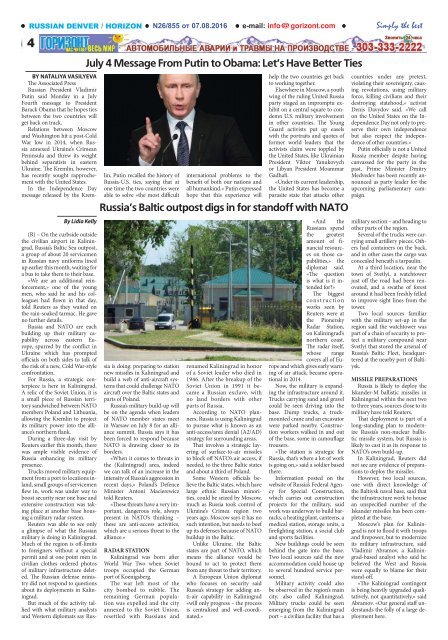Горизонт N26/855
Горизонт (газета) — (Gorizont англ. Horizon ) первая и наиболее влиятельная газета, издающаяся на русском языке в штатеКолорадо, США. Еженедельник, выходит по пятницам, формат Таблоид, 128 цветных и чернобелых страниц, распространяется в городах, составляющих метрополию Денвера (Большой Денвер), и в других населенных пунктах штата Колорадо от графства Саммит до графства Эль—Пасо. Полная электронная версия газеты «Горизонт» доступна в сети Интернет. Подробнее http://en.wikipedia.org/wiki/Gorizont_(newspaper)
Горизонт (газета) — (Gorizont англ. Horizon ) первая и наиболее влиятельная газета, издающаяся на русском языке в штатеКолорадо, США. Еженедельник, выходит по пятницам, формат Таблоид, 128 цветных и чернобелых страниц, распространяется в городах, составляющих метрополию Денвера (Большой Денвер), и в других населенных пунктах штата Колорадо от графства Саммит до графства Эль—Пасо. Полная электронная версия газеты «Горизонт» доступна в сети Интернет. Подробнее http://en.wikipedia.org/wiki/Gorizont_(newspaper)
You also want an ePaper? Increase the reach of your titles
YUMPU automatically turns print PDFs into web optimized ePapers that Google loves.
RUSSIAN DENVER / HORIZON<br />
4<br />
By Lidia Kelly<br />
July 4 Message From Putin to Obama: Let’s Have Better Ties<br />
BY NATALIYA VASILYEVA<br />
The Associated Press<br />
Russian President Vladimir<br />
Putin said Monday in a July<br />
Fourth message to President<br />
Barack Obama that he hopes ties<br />
between the two countries will<br />
get back on track.<br />
Relations between Moscow<br />
and Washington hit a post-Cold<br />
War low in 2014, when Russia<br />
annexed Ukraine’s Crimean<br />
Peninsula and threw its weight<br />
behind separatists in eastern<br />
Ukraine. The Kremlin, however,<br />
has recently sought rapprochement<br />
with the United States.<br />
In the Independence Day<br />
message released by the Kremlin,<br />
Putin recalled the history of<br />
Russia-U.S. ties, saying that at<br />
one time the two countries were<br />
able to solve «the most difficult<br />
international problems to the<br />
benefit of both our nations and<br />
all humankind.» Putin expressed<br />
hope that this experience will<br />
help the two countries get back<br />
to working together.<br />
Elsewhere in Moscow, a youth<br />
wing of the ruling United Russia<br />
party staged an impromptu exhibit<br />
on a central square to condemn<br />
U.S. military involvement<br />
in other countries. The Young<br />
Guard activists put up easels<br />
with the portraits and quotes of<br />
former world leaders that the<br />
activists claim were toppled by<br />
the United States, like Ukrainian<br />
President Viktor Yanukovych<br />
or Libyan President Moammar<br />
Gadhafi.<br />
«Under its current leadership,<br />
the United States has become a<br />
parasite state that attacks other<br />
Russia’s Baltic outpost digs in for standoff with NATO<br />
(R) – On the curbside outside<br />
the civilian airport in Kaliningrad,<br />
Russia’s Baltic Sea outpost,<br />
a group of about 20 servicemen<br />
in Russian navy uniforms lined<br />
up earlier this month, waiting for<br />
a bus to take them to their base.<br />
«We are an additional reinforcement,»<br />
one of the young<br />
men, who said he and his colleagues<br />
had flown in that day,<br />
told Reuters as they waited on<br />
the rain-soaked tarmac. He gave<br />
no further details.<br />
Russia and NATO are each<br />
building up their military capability<br />
across eastern Europe,<br />
spurred by the conflict in<br />
Ukraine which has prompted<br />
officials on both sides to talk of<br />
the risk of a new, Cold War-style<br />
confrontation.<br />
For Russia, a strategic centerpiece<br />
is here in Kaliningrad.<br />
A relic of the Soviet Union, it is<br />
a small piece of Russian territory<br />
sandwiched between NATO<br />
members Poland and Lithuania,<br />
allowing the Kremlin to project<br />
its military power into the alliance’s<br />
northern flank.<br />
During a three-day visit by<br />
Reuters earlier this month, there<br />
was ample visible evidence of<br />
Russia enhancing its military<br />
presence.<br />
Trucks moved military equipment<br />
from a port to locations inland,<br />
small groups of servicemen<br />
flew in, work was under way to<br />
boost security near one base and<br />
extensive construction was taking<br />
place at another base housing<br />
a military radar system.<br />
Reuters was able to see only<br />
a glimpse of what the Russian<br />
military is doing in Kaliningrad.<br />
Much of the region is off-limits<br />
to foreigners without a special<br />
permit and at one point men in<br />
civilian clothes ordered photos<br />
of military infrastructure deleted.<br />
The Russian defense ministry<br />
did not respond to questions<br />
about its deployments in Kaliningrad.<br />
But much of the activity tallied<br />
with what military analysts<br />
and Western diplomats say Russia<br />
is doing: preparing to station<br />
new missiles in Kaliningrad and<br />
build a web of anti-aircraft systems<br />
that could challenge NATO<br />
aircraft over the Baltic states and<br />
parts of Poland.<br />
Russia’s military build-up will<br />
be on the agenda when leaders<br />
of NATO member states meet<br />
in Warsaw on July 8 for an alliance<br />
summit. Russia says it has<br />
been forced to respond because<br />
NATO is drawing closer to its<br />
borders.<br />
«When it comes to threats in<br />
the (Kaliningrad) area, indeed<br />
we can talk of an increase in the<br />
intensity of Russia’s aggression in<br />
recent days,» Poland’s Defence<br />
Minister Antoni Macierewicz<br />
told Reuters.<br />
«These threats have a very important,<br />
dangerous role, always<br />
present in NATO’s thinking –<br />
these are anti-access activities,<br />
which are a serious threat to the<br />
alliance.»<br />
RADAR STATION<br />
Kaliningrad was born after<br />
World War Two when Soviet<br />
troops occupied the German<br />
port of Koenigsberg.<br />
The war left most of the<br />
city bombed to rubble. The<br />
remaining German population<br />
was expelled and the city<br />
annexed to the Soviet Union,<br />
resettled with Russians and<br />
<strong>N26</strong>/<strong>855</strong> от 07.08.2016 e-mail: info@gorizont.com Simply the best<br />
renamed Kaliningrad in honor<br />
of a Soviet leader who died in<br />
1946. After the breakup of the<br />
Soviet Union in 1991 it became<br />
a Russian exclave, with<br />
no land borders with other<br />
parts of Russia.<br />
According to NATO planners,<br />
Russia is using Kaliningrad<br />
to pursue what is known as an<br />
anti-access/area denial (A2/AD)<br />
strategy for surrounding areas.<br />
That involves a strategic layering<br />
of surface-to-air missiles<br />
to block off NATO’s air access, if<br />
needed, to the three Baltic states<br />
and about a third of Poland.<br />
Some Western officials believe<br />
the Baltic states, which have<br />
large ethnic Russian minorities,<br />
could be seized by Moscow,<br />
much as Russia took control of<br />
Ukraine’s Crimea region two<br />
years ago. Moscow says it has no<br />
such intention, but needs to beef<br />
up its defenses because of NATO<br />
buildup in the Baltic.<br />
Unlike Ukraine, the Baltic<br />
states are part of NATO, which<br />
means the alliance would be<br />
bound to act to protect them<br />
from any threat to their territory.<br />
A European Union diplomat<br />
who focuses on security said<br />
Russia’s strategy for adding anti-air<br />
capability in Kaliningrad<br />
«will only progress – the process<br />
is centralized and well-coordinated.»<br />
«And the<br />
Russians spend<br />
the greatest<br />
amount of financial<br />
resources<br />
on those capabilities,»<br />
the<br />
diplomat said.<br />
«The question<br />
is what is it intended<br />
for?»<br />
The biggest<br />
construction<br />
works seen by<br />
Reuters were at<br />
the Pionersky<br />
Radar Station,<br />
on Kaliningrad’s<br />
northern coast.<br />
The radar itself,<br />
whose range<br />
covers all of Europe<br />
and which gives early warning<br />
of air attack, became operational<br />
in 2014.<br />
Now, the military is expanding<br />
the infrastructure around it.<br />
Trucks carrying sand and gravel<br />
could be seen driving into the<br />
base. Dump trucks, a truckmounted<br />
crane and an excavator<br />
were parked nearby. Construction<br />
workers walked in and out<br />
of the base, some in camouflage<br />
trousers.<br />
«The station is strategic for<br />
Russia, that’s where a lot of work<br />
is going on,» said a soldier based<br />
there.<br />
Information posted on the<br />
website of Russia’s Federal Agency<br />
for Special Construction,<br />
which carries out construction<br />
projects for the military, said<br />
work was underway to build barracks,<br />
a heating plant, canteens, a<br />
medical station, storage units, a<br />
firefighting station, a social club<br />
and sports facilities.<br />
New buildings could be seen<br />
behind the gate into the base.<br />
Two local sources said the new<br />
accommodation could house up<br />
to several hundred service personnel.<br />
Military activity could also<br />
be observed in the region’s main<br />
city, also called Kaliningrad.<br />
Military trucks could be seen<br />
emerging from the Kaliningrad<br />
port – a civilian facility that has a<br />
countries under any pretext,<br />
violating their sovereignty, causing<br />
revolutions, using military<br />
force, killing civilians and their<br />
destroying statehood,» activist<br />
Denis Davydov said. «We call<br />
on the United States on the Independence<br />
Day not only to preserve<br />
their own independence<br />
but also respect the independence<br />
of other countries.»<br />
Putin officially is not a United<br />
Russia member despite having<br />
canvassed for the party in the<br />
past. Prime Minister Dmitry<br />
Medvedev has been recently announced<br />
as party leader for the<br />
upcoming parliamentary campaign.<br />
military section – and heading to<br />
other parts of the region.<br />
Several of the trucks were carrying<br />
small artillery pieces. Others<br />
had containers on the back,<br />
and in other cases the cargo was<br />
concealed beneath a tarpaulin.<br />
At a third location, near the<br />
town of Svetlyi, a watchtower<br />
just off the road had been renovated,<br />
and a swathe of forest<br />
around it had been freshly felled<br />
to improve sight lines from the<br />
tower.<br />
Two local sources familiar<br />
with the military set-up in the<br />
region said the watchtower was<br />
part of a chain of security to protect<br />
a military compound near<br />
Svetlyi that stored the arsenal of<br />
Russia’s Baltic Fleet, headquartered<br />
at the nearby port of Baltiysk.<br />
MISSILE PREPARATIONS<br />
Russia is likely to deploy the<br />
Iskander-M ballistic missiles in<br />
Kaliningrad within the next two<br />
to three years, sources close to its<br />
military have told Reuters.<br />
That deployment is part of a<br />
long-standing plan to modernize<br />
Russia’s non-nuclear ballistic<br />
missile system, but Russia is<br />
likely to cast it as its response to<br />
NATO’s own build-up.<br />
In Kaliningrad, Reuters did<br />
not see any evidence of preparations<br />
to deploy the missiles.<br />
However, two local sources,<br />
one with direct knowledge of<br />
the Baltiysk naval base, said that<br />
the infrastructure work to house<br />
an unspecified number of the<br />
Iskander missiles has been completed<br />
at the base.<br />
Moscow’s plan for Kaliningrad<br />
is not to flood it with troops<br />
and firepower, but to modernize<br />
its military infrastructure, said<br />
Vladimir Abramov, a Kaliningrad-based<br />
analyst who said he<br />
believed the West and Russia<br />
were equally to blame for their<br />
stand-off.<br />
«The Kaliningrad contingent<br />
is being heavily upgraded qualitatively,<br />
not quantitatively,» said<br />
Abramov. «Our general staff understands<br />
the folly of a large deployment<br />
here.
















